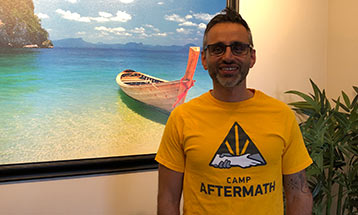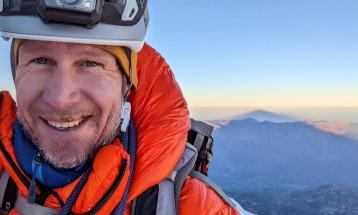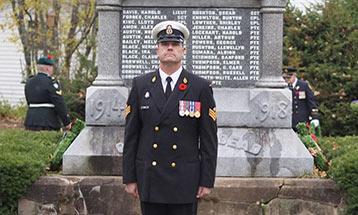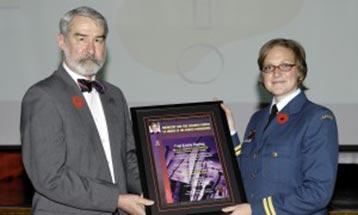Some wear their hearts on their sleeve. Veteran Farid Yaghini wears his philosophy on his arm. Literally: on his right arm are tattoos representing his heritage, his beliefs, and a maple leaf.
Born in Iran in 1980, Farid fled with his family from religious persecution in 1987. Two years later, they arrived in Canada as refugees, settling in Whitby, Ontario.
Farid recalls feeling a lot of anger and resentment growing up: anger at the people who drove his family from their home, resentment of the bullying he endured, and of the discrimination he faced. “A lot of the young people around me turned to crime to make money. I resisted the temptation—I didn’t want to disappoint my parents.”
After earning a diploma in telecommunications, he joined the Canadian Armed Forces. “When my Dad found out, he was not pleased,” Farid laughs. “He had taken great risks during war in Iran, and here was his only son volunteering for one. Also, this was in 2002—one year after 9-11.”
Farid’s initial goal was to spend three years in the CAF, then become a police officer in Toronto. But he found something in military life he hadn’t expected. “A sense of belonging. The Forces strip you down to the studs, then rebuild you. They put you on a pedestal, setting you apart from civilians and providing a tribe. Partly, this justifies the sacrifices you have to make, like being away from your family and missing anniversaries.”
In 2004, Farid deployed in the Royal 22nd Regiment. From Camp Julien in Afghanistan, Farid provided linguistic support to intelligence and combat units.
Despite the trauma he witnessed, Farid says the work he did was therapeutic. “I loved feeling that I was contributing.” He says that the weight of anger he had felt before joining lifted. “When I saw that the conflict had nothing to do with religion, that lifted a lot of resentment I felt against people who forced my family to flee our home.”
In 2004, Farid was beginning to think about life after the army as his three year contract was coming to an end. He and Cindy, his future wife, bought a house in Ajax, Ontario, close to Farid’s parents in Whitby. “I thought I was getting out, but then Special Forces offered to take me back as a translation liaison.
“I knew that was my purpose.”
This time, he deployed to Kandahar in time for various counter-insurgency operations. This tour saw a lot of action. Once, a helicopter he was in was shot down; some 60 Canadians, Americans and Afghans held their remote position for five days, often under fire, before they could be evacuated.
Finding a new purpose
Returning from that rotation in 2006, Farid tried to hide symptoms of anxiety. “I needed a purpose.”
One technique that helped was what a counsellor described as “flickers”: positive memories. One is a photo of a young girl in Afghanistan, pumping water from a well with a Canadian flag on it; another was of a Canadian foot patrol picking up an ill Afghan child to take her to lifesaving surgery in Canada, and later returning her to her family.
He tried to ignore problems sleeping and panic attacks. “Mental health wasn’t such a big deal in those days,” he recalls. In 2007, he was posted to CFS Leitrim, near Ottawa. In 2009, he married Cindy and they settled in the area.
In 2010, in favour of family obligations, Farid decided to release. “I never signed up to be in garrison all the time.” He found a job with the federal public service, similar to his job in the CAF. But he describes his release from service as “painful.” He did not find the programs at the time to help with transition to be useful.
Even after the birth of his daughter Callie in 2013, Farid missed the sense of purpose he had in the military. “I felt aimless, and guilty about the people I left behind in Afghanistan.”
His lowest point came in 2016, after his divorce. “It’s when you reach your lowest point that you can begin to make real changes.” A counsellor advised him to find a new purpose.
Farid volunteered with several organizations, including some that helped Veterans. “I saw gaps in the services Veterans got,” he says. “There was no follow-up.”
Inspired to fill those gaps, he and friends organized Camp Aftermath. This one-year program supports Veterans and first responders living with PTSD; with a mental health expert overseeing each of three phases. In one phase participants spent a week in Costa Rica, helping build homes for refugees. Since the pandemic, the program has shifted to Knowlton, Quebec, helping in a camp that supports people living with intellectual disability or autism spectrum disorder.
Between phases, members meet regularly for wellness check-ins.
With his new sense of purpose, Farid wrote a book. Life in Rotation: From Persecuted Iranian to Proud Canadia, is scheduled for release in summer 2023.
Far from leaving comrades behind, Farid Yaghini is helping to bring Veterans through transition with a new sense of purpose and connection.
Tips for release
Most important for those approaching release from CAF service, Farid says, is to find a new purpose. It’s also vital to build a new “tribe” outside the military. “It’s work—the military gave you that tribe and that purpose. The military may have become part of you, but it’s not all of you.”
Explore volunteering, Farid advises “Volunteerism has a way of connecting you with people who also have the same sense of duty. Try to expand your circle to others and start to create connection and emphasize with other people’s journeys.
“Become aware of why you loved the military life. Use that to build new connections in the civilian community.”
Publish date: 28 March 2023






